- Home
- David Levithan
Hold Me Closer: The Tiny Cooper Story Page 2
Hold Me Closer: The Tiny Cooper Story Read online
Page 2
you might have to run before you can walk.
CROWD:
Oh! What a Big Gay Baby!
We’re not really sure how we feel.
MEN IN CROWD:
Be a man, boy! Be a man!
WOMEN IN CROWD:
That’s our plan, boy! That’s our plan!
CROWD:
Oh! What a Big Gay Baby!
Already the size of a giant T. rex.
Oh! What a Big Gay Baby!
So unimpressed by the opposite sex.
He dances to show tunes
and has cheeks round as full moons.
We wish he’d show some respect,
but with a Big Gay Baby, what can you ex—
MOM AND DAD (spoken):
Shhh! He’s sleeping!
CROWD
(turning it into a lullaby):
Goodnight Sondheim, goodnight June.
Goodnight faggot, goodnight room.
Welcome, Big Gay Baby!
You’re going to find . . .
it’s a helluva world!
ACT I, SCENE 2
Now Tiny is four. (If he’s wearing a button, change it to AGE: 4.) The carriage is wheeled offstage, and Mom and Dad return carrying a pew-like bench. They sit down on it, with Tiny in the middle. The chorus arranges itself behind them, in the formation of a church choir.
Tiny looks a little uncomfortable between his parents.
TINY:
It wasn’t very long before my parents introduced me to their religion. I was four, so I didn’t know there was any possibility of questioning it. Plus, I wanted so much to fit in. I know that’s the story of our whole lives, but it all starts here. More than anything else, we want to fit into our own families.
DAD:
Son, it’s very important to me that you take this seriously.
TINY:
Yes, Dad.
MOM:
It’s not to be questioned. This is how we were raised, and it’s how we are going to raise you. It is very important to us.
TINY:
I understand, Mom.
MOM AND DAD:
Good.
The music for “RELIGION” should be . . . well . . . religious. Hymnlike and intense, as if sung by a true church choir. It must be sung very seriously, as if we’re in a house of worship. I mean, not in a Sister Act, gospel-choir sense—these are NOT nuns led by Whoopi Goldberg. They are from Illinois. And not the gospel parts of Illinois. We are deep in the suburbs here.
Tiny looks slightly uncomfortable in the pew.
[“RELIGION”]
DAD, MOM, AND CHORUS:
Every Sunday
Every Sunday
Every Sunday
is our day
for religion.
Every Sunday
Every Sunday
Every Sunday
we congregate
and pray.
Every Sunday
Every Sunday
Every Sunday
is a
visitation.
Every Sunday
Every Sunday
Every Sunday
we watch
them play.
A television is wheeled out in front of the Cooper family. Dad turns it on. They are basked in the glow of the game. All the chorus members take out Chicago Bears banners and foam #1 fingers and begin to wave them in a synchronized, still church-like way.
As the song goes on, we should see Tiny getting more and more into it.
DAD, MOM, AND CHORUS:
Hail Mary
Hail Mary
Hail Mary . . .
Pass!
Godspeed
Godspeed
Godspeed . . .
To the end zone!
(Hymnlike, the chorus now splits into men and women, echoing each other.)
WOMEN:
Remember the Super Bowl Shuffle.
MEN:
Remember the Super Bowl Shuffle.
WOMEN:
In this land of plenty—
MEN:
In this land of plenty—
WOMEN:
—we won Super Bowl Twenty.
MEN:
—we won Super Bowl Twenty.
WOMEN AND MEN TOGETHER (in crescendo):
Ditka!
Ditka!
Ditka!
(For those of you who prefer to avoid sports at all costs, Mike Ditka was not only a player when the Chicago Bears won the national championship in 1963, he was the head coach when they won in 1985. This is like Bernadette Peters winning a Tony for Song & Dance in 1985 and then coming back in 2007 and winning for directing a revival of it. Which didn’t happen, but I wish it had.)
As Mom, Dad, and the chorus silently cheer on the Bears, Tiny speaks from the bench (aka our den’s lime-green couch):
TINY:
I fell into my parents’ religion not because it was required, not because they forced me into it, but because they invited me in and showed me the beauty of it, the faith it required, the devotion a person could give to something outside of himself. During that magical stretch from September to January, we would enclose ourselves in game time, watching the intricate, spontaneous choreography of each face-off, either on television or in the stadium itself. Only a nonbeliever looks at football and sees brute strength. A believer can see all of the layers—the strategy, the teamwork, the individual personalities clicking together. You can only control the game so much from the bleachers, so loving this game means having to give yourself up to the unpredictable, the unknowable. Your heart is bruised with every loss, but it’s never broken. You sing with invincible joy at every win, but you’re still vulnerable when the next game comes. My parents taught me all this, sometimes by telling me, but mostly by example.
Tiny now joins in with the song.
TINY, DAD, MOM, AND CHORUS:
In the cold,
in the wind,
we’ll be there for you.
Your agony,
your ecstasy,
we will feel it.
For four whole hours
there will be no other cares.
Just the sound of the play-by-play
of what happens to our Bears!
DAD (TO TINY):
You throw the ball and hope.
TINY (repeating, learning):
You throw the ball and hope.
DAD (TO TINY):
You catch the ball and run.
TINY (repeating, learning):
You catch the ball and run.
MOM AND CHORUS:
As you gather on the field,
we will gather in our homes.
And we will pray.
Yes, we will pray.
(TINY AND DAD JOIN IN.)
Every Sunday!
Every Sunday!
Every Sunday!
And sometimes Monday!
Try as hard as you can to convey what it’s like to be together on a Sunday with your family, watching the Big Game. This might seem like a superficial number in the overall context of Tiny Cooper’s life, but I assure you that it is not. The purity of his parents’ belief—even if it’s in the name of football—is one of the guiding lights for Tiny, and enables him to do all of the things he’s about to do. He won’t grow up to be a Bear himself (well, not in a football sense), and in truth, as his musical pursuits take hold, there will be Sundays when he will skip watching the game because of a badly timed matinee. But still he’s taking the energy that was generated in these early days and using it to find his own religion, which will serve him well, even if at times it’s confusing beyond belief.
Tiny’s
parents don’t know it and will never understand it, but they’re his role models.
ACT I, SCENE 3
The chorus members leave the stage, with Tiny remaining on the bench, still flanked by his parents.
TINY:
My parents kept me sheltered, protecting me from the haters that were out there in the world. I was my mom and dad’s favorite thing, and this was always clear to me. But the older I got, they couldn’t be there all the time.
DAD:
I have meetings.
MOM:
So many meetings interceding. I have functions.
DAD:
So many functions we can’t function.
MOM:
We’re committed to commitments.
DAD:
So committed to commitments.
On the bench, Mom and Dad start to pull away, doing other things. Tiny changes his button so it reads AGE: 5.
TINY:
Because of my size, everyone always thought I was older than I really was. The kindergarten teacher actually tried to turn me away on the first day of school. She probably would’ve served me a vodka tonic if I’d asked for one. But even though my body had grown, my heart and my mind were still the age they were supposed to be. And as my parents drifted further and further away, other people came into my life.
Mom and Dad leave the bench. LYNDA appears in the wings. She is dressed like a very cool, down-to-earth sixteen-year-old girl.
TINY:
The first close relationship I had with anyone outside my family was with Lynda, my lesbian babysitter. I have no idea if my parents knew she was lesbian or not. I have no idea if I knew what that meant at the time. All I knew was that I worshipped Lynda. To me, she was everything that adulthood stood for . . . making phone calls, knowing what was on TV, driving a car. To me, sixteen seemed like the height of adulthood. And every now and then, Lynda would let me get close to it, to see what it was really like.
LYNDA:
Who’s my favorite guy?
TINY:
I am!
LYNDA:
And who will you never date?
TINY:
Jerks and assholes!
LYNDA:
That’s right.
Lynda sits down next to Tiny on the bench. Even though Tiny sees her as being effortlessly old, she’s really just a sixteen-year-old girl dealing with everyone’s shit, including her own. The time she spends with Tiny is her escape from the outside world, and she wants to teach him a few things about life before she inevitably leaves him for Oberlin.
“THE BALLAD OF THE LESBIAN BABYSITTER” is vulnerable and wistful, as if Joni Mitchell herself had come over for ten dollars an hour to share some world-weary wisdom with her big, gay babysittee.
Bonus points if you can find an actress for Lynda who has hair long enough to sit on. She was that awesome.
Cue music.
[“THE BALLAD OF THE LESBIAN BABYSITTER”]
LYNDA:
Come over here
and give me a hug
because my soul’s been treated
like a threadbare rug.
Me and Heather
were meant to be forever,
but now she’s into leather
and Red Bull dykes
who keep her out all night.
TINY:
Is there anything I can do?
LYNDA:
Just rub my shoulder
because I’m feeling so much older.
Rub my back
and drain me of the black that’s left
when a relationship ends.
He rubs her back.
Now hand me my sketchbook
so I can use this pain
to pull my hopes
back out of the drain.
Watch carefully, Tiny,
how to disable your rage
by unleashing it onto
an empty page.
TINY (to audience):
It didn’t matter that I was five—
I saw her pain come alive.
Just like a sorcerer
fighting a deadly foe,
she met it eye to eye
and wouldn’t let go.
Drawing the girls who always hurt her,
sketching the loves as they’d desert her.
All the drama became less troubled
once the hard words had been inked and
bubbled.
LYNDA (TO TINY):
Look forward to the moment
when it all falls apart.
Look forward to the moment
when you must rearrange your heart.
It might feel like the end of the world—
but it’s the beginning of your art.
Lynda sketches during an instrumental, then puts down the book, sighs, and sings the next verse to Tiny.
LYNDA:
Come over here
and give me a peck
because my faith in people’s
a miserable wreck.
He kisses her cheek.
Me and Leigh
were meant to be,
but now she wants to flee
into the arms of a maître d’
at a boulangerie—
and she doesn’t even like
to French.
TINY:
Is there anything I can do?
LYNDA:
Just rub my feet,
ease my defeat.
Rub my neck
so I’m no longer the speck that remains
when a relationship ends.
Now hand me my sketchbook
so I can use this pain
to pull my hopes
back out of the drain.
Watch carefully, Tiny,
how to disable your rage
by unleashing it onto
an empty page.
Are you listening?
TINY:
I am listening.
LYNDA:
Are you watching?
TINY:
I am watching.
LYNDA AND TINY:
Look forward to the moment
when it all falls apart.
Look forward to the moment
when you must rearrange your heart.
It might feel like the end of the world
but it’s the beginning of your art.
Lynda rips out a page and gives it to Tiny, who folds it carefully and keeps it. (He still has it.)
The song ends, but the advice continues. (He still remembers it.)
LYNDA:
Don’t get trapped into thinking people are halves instead of wholes.
TINY:
People are halves?
LYNDA:
They’re not trying to sell you on it yet, but believe me, they will. The idea that two is the ideal, and that one is only good as half of two. You are not a half, and you should never treat someone else like a half. Agreed?
TINY:
Agreed!
She hugs him. End scene.
ACT I, SCENE 4
As the stage goes dark (and the scenery is changed), Tiny steps forward, again in the spotlight.
TINY:
Having a babysitter and two parents in your corner is great—but what I really wanted was a best friend. I had plenty of friends—there was no shortage of birthday party invitations in my cubbyhole—but I had yet to find my co-conspirator, my co-adventurer, the right-hand man who I’d give my left arm for.
And then Phil Wrayson came into my life.
Now, I’m sure that I joined Pee Wee League because I wanted to play baseball. But soon I fo
und that the best part of Pee Wee League wasn’t the playing—it was all the time when we weren’t playing, when we were just hanging around in the dugout or on the field. Phil Wrayson and I went to school together, but it wasn’t really until Pee Wee League that we got to know each other.
At this point, a kid dressed as a batboy should walk out and give Tiny a baseball cap and a button that reads AGE: 8.
When the lights rise on the stage, it’s been turned into a dugout. Right now the only kid sitting there is PHIL WRAYSON, deep in thought. An open book is in front of him, although he’s not reading it. All the other players are on the field.
Physically, there’s nothing remarkable about Phil Wrayson. He’s cute, but there’s nothing striking about his cuteness. You can imagine hundreds of other guys who are just as cute. The thing about Phil is that he’s a really good guy. I know that’s hard to show onstage, but there’s something about his goodness that needs to be conveyed. Again, it isn’t striking—a guy who advertises his own goodness is just another kind of asshole. The goodness is just a part of who Phil is. He doesn’t even realize it.
The cadences of “HEY, WHATCHA DOING?” are very much the cadences of two eight-year-old boys—even if the vocabulary level may admittedly be heightened here for dramatic/comedic (cometic? dramedic?) effect. Tiny is trying his darnedest to start a musical conversation with Phil, but at first, Phil’s not into it. Luckily, Tiny’s persistent—like Angel in Rent, but without the cross-dressing and the specter of AIDS hovering over everything. By the end of the song, Tiny and Phil are friends.
[“HEY, WHATCHA DOING?”]
TINY (sung cheerily):
Hey, whatcha doing?!?
PHIL (spoken, not looking up):
Not much.
It feels like the song is over. The shortest song in the history of friendship. Phil starts to read the book in front of him, a little embarrassed to have been caught daydreaming. Tiny tries again.
TINY (sung):
Hey, whatcha reading?
PHIL (spoken):
I’m reading about snakes.
He holds up the book. It’s about snakes. Again, it seems like the song will end here. But Tiny persists.
TINY (sung):
Hey, what’s it saying?
PHIL (spoken):
About snakes?
TINY (sung):
Yeah, about snakes. Tell me everything I’ve
always wanted to know about snakes but was
afraid to ask!
PHIL (spoken):
Well . . . a lot of them are poisonous.
TINY (sung):

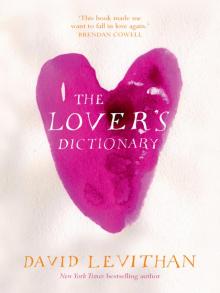 The Lover's Dictionary
The Lover's Dictionary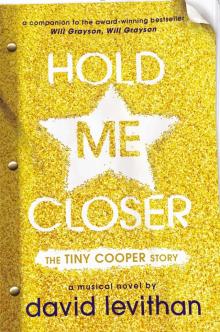 Hold Me Closer: The Tiny Cooper Story
Hold Me Closer: The Tiny Cooper Story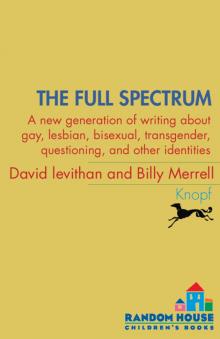 The Full Spectrum
The Full Spectrum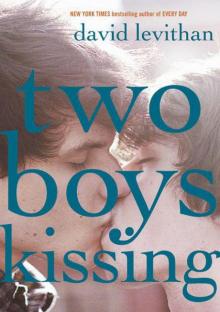 Two Boys Kissing
Two Boys Kissing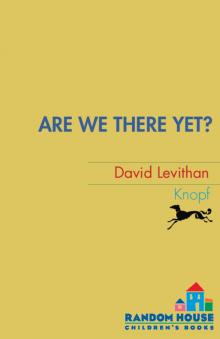 Are We There Yet?
Are We There Yet?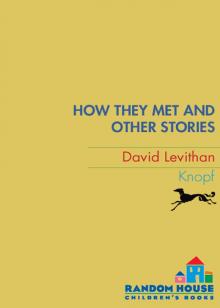 How They Met and Other Stories
How They Met and Other Stories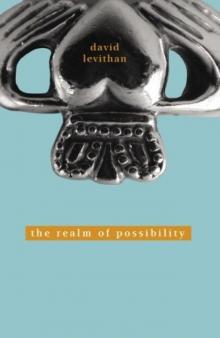 The Realm of Possibility
The Realm of Possibility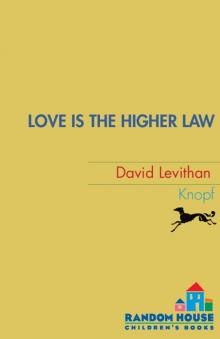 Love Is the Higher Law
Love Is the Higher Law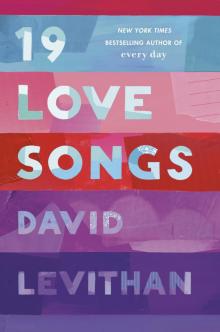 19 Love Songs
19 Love Songs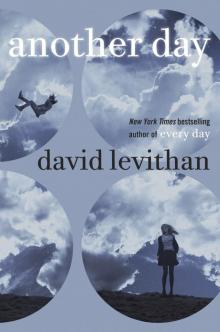 Another Day
Another Day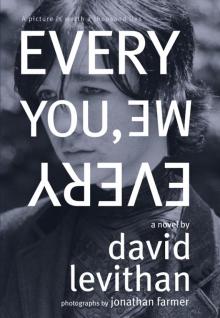 Every You, Every Me
Every You, Every Me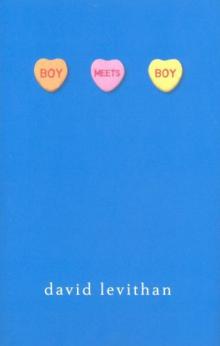 Boy Meets Boy
Boy Meets Boy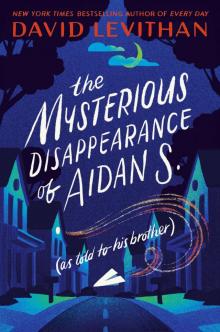 The Mysterious Disappearance of Aidan S. (as told to his brother)
The Mysterious Disappearance of Aidan S. (as told to his brother)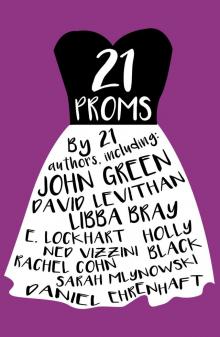 21 Proms
21 Proms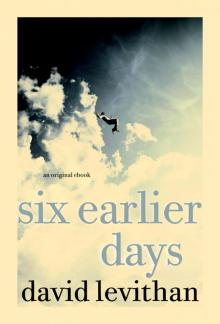 Six Earlier Days
Six Earlier Days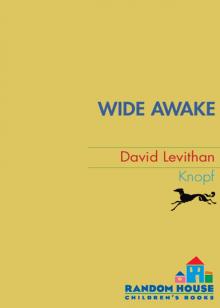 Wide Awake
Wide Awake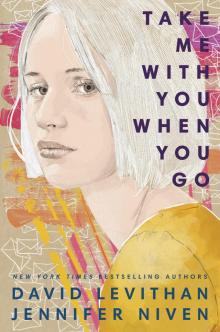 Take Me With You When You Go
Take Me With You When You Go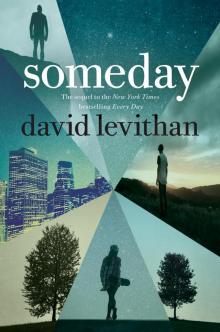 Someday
Someday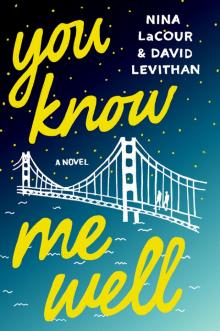 You Know Me Well
You Know Me Well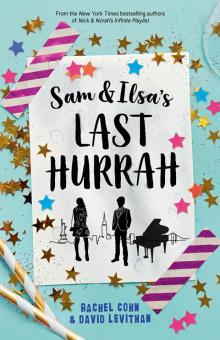 Sam and Ilsa's Last Hurrah
Sam and Ilsa's Last Hurrah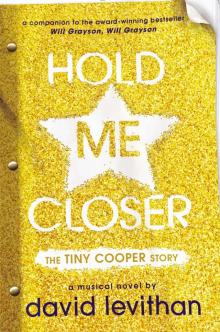 Hold Me Closer
Hold Me Closer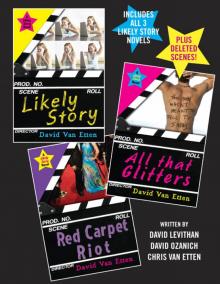 Likely Story!
Likely Story!